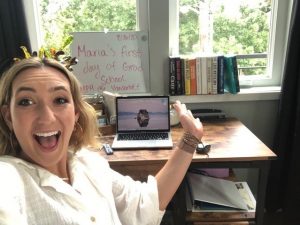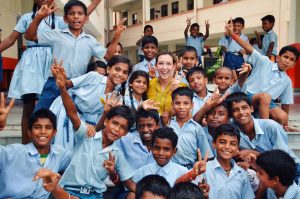
This year marks five years of ACE programming. We’re celebrating by looking back at our first year programs, reflecting with our first year participants on what ACE has meant to them, and learning what our ACE alums are up to now.
This week we interviewed Class of 2018 Duke graduate, Women’s Swimming and Diving team member and ACE in India ’16 alum, Maria Sheridan. She reveals how ACE taught her lessons in adaptability and cultural competency, then gives advice to future #ACEathletes.
What are you doing now? How did ACE influence your academic or career path?
I am headed back to school! I’ll be attending Vanderbilt University, pursing a Master in Public Health. I could not be more excited! Prior to graduate school, I worked at Wells Fargo as a US and international health and well-being analyst.

ACE fully contributed to my decision to study and work in the global health field. While I was in India, I was introduced to different cultures, beliefs, and perspectives. I was fascinated by everything around me! While I saw amazing monuments and temples, I also saw an influx of health disparities and a staggering wage gap. This issue isn’t only in India. It’s something every country, city, and community faces.
There is inequality and inequity all around us, and it’s up to society to figure out how to solve these inequalities. My time in India sparked my initial curiosity in focusing on public health and the social determinants of health.
What was the most meaningful part of your ACE experience?
ACE prepared me for the unknown. Prior to starting, I played various scenarios in my head. I thought about lesson-planning way too much and had the picture-perfect idea of what teaching would look like. When Alexa and I finally got in the classroom, that picture disappeared. ACE forced me to become more adaptable. I had to learn how to be flexible and deal with unforeseen challenges that came along the way.
“My time in India sparked my initial curiosity in focusing on public health and the social determinants of health.”
ACE also helped me understand the need for cultural competency. Going in, I assumed that my “American norms” could fix any issue. I quickly learned that wasn’t the case, and often for good reason. Learning to understand, respect and value other cultures and norms is a key takeaway from my ACE experience.
Share a specific lesson you learned from your ACE experience that still holds true today.
In one of the classrooms I taught in there were two windows. One window looked out on the neighborhood where the majority of the student’s lived. The other looked out onto corporate high rises. Within that one room you could sense vast inequity. The noticeable divide bothered me. It made me reflect on my own privilege, namely the education I have been afforded my whole life.
The students I worked with (5th– 11th grade) didn’t seem fazed by the two windows. Rather, they were the most motivated, curious, and diligent students I had ever seen. They exuded joy, loved to gossip, and counted down the minutes till recess. Each and every one was a “model student.”

I’m roughly 8,000 miles away from New Delhi. Those miles include a lot of differences in culture, perspectives, and opportunities. However, I am still struck by similarities all kids share. Regardless if a student is in Durham or Delhi, they want to be accepted, loved, and happy. They want to play, disrupt the teacher, and chat at lunch.
ACE taught me that it doesn’t matter where you’re from, the religion you practice, or what you see outside your window; there is a common humanity shared throughout the world.
“Figure out what you loved about your ACE experience and help out in your local community!”
Describe your ACE experience in as few words as possible.
ACE is an exceptional cultural experience that is both challenging and rewarding.
What’s one thing you want people to know about ACE?
Your ACE experience doesn’t stop when you get home. Global is local! Figure out what you loved about your ACE experience and help out in your local community!
What’s your hope for the ACE program and advice for future participants as we look ahead to the next five years?
I really believe in the ACE program. I want to see the program continue to grow and serve as an opportunity for both Duke and Stanford student-athletes to participate in civic-engagement.
Future participants, keep an open-mind, pack snacks, make friends, and don’t forget your passport!
